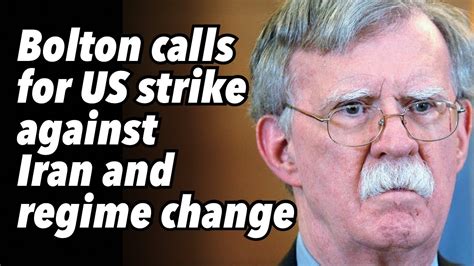
Former U.S. National Security Advisor John Bolton asserted that the Iranian regime is “in trouble” following recent U.S. military strikes in Syria, viewing the actions as a deterrent signal to Tehran and its proxies.
John Bolton, speaking on Friday, characterized the U.S. military response in Syria as a message to Iran that its actions have consequences. “I think the message to the ayatollahs in Tehran should be unmistakable,” Bolton stated. “Their proxies are fair game, and so are they.” His remarks come after U.S. forces conducted strikes against facilities in Syria used by groups affiliated with Iran’s Islamic Revolutionary Guard Corps (IRGC). The Pentagon stated the strikes were in response to a series of attacks against U.S. personnel in the region. Bolton, a long-time critic of the Iranian regime, suggested that the strikes could embolden opposition within Iran and potentially lead to significant internal challenges for the ruling government. He has consistently advocated for a tougher stance against Iran, arguing that the regime’s behavior warrants a strong and decisive response from the international community.
Bolton’s Perspective on the Strikes
Bolton’s commentary underscores a broader debate about the effectiveness of U.S. policy in the Middle East, particularly regarding Iran. He has been a vocal proponent of regime change in Iran, arguing that diplomatic efforts and sanctions alone are insufficient to curb its destabilizing activities. According to Bolton, the recent strikes should be seen as part of a larger strategy to contain Iran’s influence and deter further aggression. “The ayatollahs in Tehran only understand strength,” Bolton claimed. “They see weakness as an opportunity to advance their malign agenda.” He further emphasized that the U.S. needs to demonstrate a credible threat of force to prevent Iran from escalating conflicts in the region.
Context of the US Strikes
The U.S. military strikes in Syria targeted facilities used by Iranian-backed groups, which the Pentagon identified as being linked to the IRGC. The strikes were a direct response to a series of attacks against U.S. forces stationed in Iraq and Syria. These attacks, which have been increasing in frequency, have raised concerns about the safety of American personnel and the potential for a wider conflict. The Biden administration has stated that it does not seek escalation but will take necessary measures to protect its forces and deter further aggression. “These precision strikes are a response to and proportionate to the series of attacks against U.S. personnel in Iraq and Syria,” a Pentagon spokesperson stated.
Potential Implications for the Iranian Regime
Bolton’s assertion that the Iranian regime is “in trouble” raises questions about the internal stability of Iran and the potential for domestic unrest. Iran has been grappling with a range of economic and social challenges, including high inflation, unemployment, and widespread discontent over government policies. These issues have fueled protests and demonstrations across the country, posing a significant challenge to the authority of the ruling clerics. Bolton believes that a more assertive U.S. policy could exacerbate these internal pressures and potentially lead to regime collapse. “The Iranian people are yearning for freedom,” Bolton stated. “They need to know that the world is on their side.”
Broader Geopolitical Considerations
The situation in Syria and the wider Middle East is complex, with multiple actors vying for influence. Iran has been a key player in the region, supporting proxy groups in Syria, Lebanon, Iraq, and Yemen. These groups have been involved in various conflicts, exacerbating regional tensions and undermining stability. The U.S. has been working with its allies to counter Iran’s influence and promote a more balanced and peaceful regional order. However, these efforts have faced challenges, including disagreements over strategy and the involvement of other major powers, such as Russia and China.
The U.S. strikes in Syria have been met with mixed reactions. Some have praised the action as a necessary step to deter Iran and protect American forces, while others have criticized it as a potential escalation that could lead to a wider conflict. The international community remains divided over how to address the challenges posed by Iran, with some favoring diplomacy and engagement and others advocating for a more confrontational approach.
The Future of US-Iran Relations
The future of U.S.-Iran relations remains uncertain. The Biden administration has expressed a willingness to return to the 2015 nuclear deal, but negotiations have stalled over disagreements about sanctions relief and verification measures. In the absence of a diplomatic breakthrough, tensions between the two countries are likely to persist, and the risk of further escalation remains high. Bolton has consistently argued against returning to the nuclear deal, claiming that it would only embolden Iran and provide it with the resources to pursue its malign activities. He believes that a policy of maximum pressure, combined with support for the Iranian opposition, is the best way to achieve a more stable and peaceful Middle East.
Bolton’s statements highlight the ongoing debate within the U.S. foreign policy establishment regarding the best approach to dealing with Iran. While some advocate for diplomacy and de-escalation, others believe that a more assertive stance is necessary to deter Iran’s aggression and protect U.S. interests. The coming months will likely be critical in determining the future trajectory of U.S.-Iran relations and the stability of the Middle East.
Detailed Analysis of Bolton’s Statements
Bolton’s analysis rests on several key assumptions. First, he believes that the Iranian regime is inherently aggressive and expansionist, seeking to destabilize the region and undermine U.S. influence. Second, he argues that the regime is vulnerable to internal pressures and that a more assertive U.S. policy could exploit these vulnerabilities. Third, he maintains that diplomacy and sanctions alone are insufficient to curb Iran’s behavior and that a credible threat of force is necessary.
These assumptions are not universally shared. Some argue that the Iranian regime is primarily motivated by self-preservation and that its actions are a response to perceived threats from the U.S. and its allies. They also contend that internal pressures within Iran are not necessarily conducive to regime change and that a more assertive U.S. policy could backfire, leading to further radicalization and instability.
Despite these differing perspectives, Bolton’s views carry significant weight, given his past experience as a senior U.S. official and his long-standing involvement in foreign policy debates. His comments are likely to influence the ongoing discussion about U.S. policy toward Iran and the broader Middle East.
Implications for Regional Security
The U.S. strikes in Syria and Bolton’s comments have significant implications for regional security. The strikes could deter Iran and its proxies from launching further attacks against U.S. forces and allies. However, they could also provoke a retaliatory response, leading to a cycle of escalation. The situation is further complicated by the involvement of other actors, such as Russia and Turkey, who have their own interests and agendas in the region.
The potential for a wider conflict in the Middle East is a major concern. A war between the U.S. and Iran would have devastating consequences for the region and the world. It is therefore crucial that all parties exercise restraint and seek to de-escalate tensions through diplomacy and dialogue.
The Role of International Diplomacy
International diplomacy plays a critical role in addressing the challenges posed by Iran. The 2015 nuclear deal, despite its flaws, was a significant achievement in preventing Iran from developing nuclear weapons. A return to the deal, or a similar agreement, could help to reduce tensions and create a framework for addressing other issues of concern.
However, diplomacy alone is not enough. It is also necessary to address the underlying causes of instability in the region, such as sectarian conflicts, political grievances, and economic inequalities. This requires a comprehensive approach that involves all relevant actors and addresses the root causes of conflict.
The Importance of a Comprehensive Strategy
A comprehensive strategy for dealing with Iran should include several key elements:
- Deterrence: The U.S. must maintain a credible military presence in the region to deter Iran from launching attacks against U.S. forces and allies.
- Diplomacy: The U.S. should be willing to engage in diplomacy with Iran to address issues of concern and explore opportunities for cooperation.
- Sanctions: The U.S. should use sanctions strategically to pressure Iran to change its behavior.
- Support for the Iranian people: The U.S. should support the Iranian people in their struggle for freedom and democracy.
- Regional cooperation: The U.S. should work with its allies to promote stability and security in the Middle East.
By pursuing a comprehensive strategy, the U.S. can help to contain Iran’s influence, deter its aggression, and promote a more peaceful and stable Middle East.
Conclusion
John Bolton’s assertion that the Iranian regime is “in trouble” reflects a long-held view that a more assertive U.S. policy is needed to address the challenges posed by Iran. The recent U.S. strikes in Syria underscore the ongoing tensions between the two countries and the potential for further escalation. The future of U.S.-Iran relations remains uncertain, but it is clear that a comprehensive strategy is needed to contain Iran’s influence, deter its aggression, and promote a more peaceful and stable Middle East. This strategy must include deterrence, diplomacy, sanctions, support for the Iranian people, and regional cooperation. The path forward will be challenging, but it is essential to avoid a wider conflict and create a more secure future for the region. The impact of these strikes and the subsequent reactions will continue to unfold, shaping the geopolitical landscape of the Middle East for the foreseeable future. Bolton’s perspective, while controversial, adds a crucial voice to the ongoing debate about the best approach to managing the complex relationship between the U.S. and Iran. His emphasis on strength and deterrence highlights a persistent divide in American foreign policy circles, with implications that extend far beyond the immediate context of the Syrian strikes.
FAQ Section:
1. Why did the U.S. conduct military strikes in Syria?
The U.S. military strikes in Syria were conducted in response to a series of attacks against U.S. personnel in Iraq and Syria. These attacks, which have been increasing in frequency, have raised concerns about the safety of American personnel and the potential for a wider conflict. The Pentagon stated that the strikes targeted facilities used by Iranian-backed groups affiliated with Iran’s Islamic Revolutionary Guard Corps (IRGC).
2. What is John Bolton’s view on the Iranian regime?
John Bolton is a long-time critic of the Iranian regime. He believes that the regime is inherently aggressive and expansionist, seeking to destabilize the region and undermine U.S. influence. He has consistently advocated for a tougher stance against Iran, arguing that diplomatic efforts and sanctions alone are insufficient to curb its destabilizing activities. He has also supported regime change in Iran.
3. What are the potential implications of the U.S. strikes for the Iranian regime?
Bolton believes the strikes could embolden opposition within Iran and potentially lead to significant internal challenges for the ruling government. The Iranian regime has been grappling with economic and social challenges, including high inflation, unemployment, and widespread discontent over government policies. A more assertive U.S. policy could exacerbate these internal pressures and potentially lead to regime collapse.
4. What is the Biden administration’s policy towards Iran?
The Biden administration has expressed a willingness to return to the 2015 nuclear deal, but negotiations have stalled over disagreements about sanctions relief and verification measures. The administration has stated that it does not seek escalation but will take necessary measures to protect its forces and deter further aggression.
5. What are the broader geopolitical considerations in the region?
The situation in Syria and the wider Middle East is complex, with multiple actors vying for influence. Iran has been a key player in the region, supporting proxy groups in Syria, Lebanon, Iraq, and Yemen. The U.S. has been working with its allies to counter Iran’s influence and promote a more balanced and peaceful regional order. However, these efforts have faced challenges, including disagreements over strategy and the involvement of other major powers, such as Russia and China.
In-depth Analysis and Expanded Context:
Bolton’s assessment of Iran’s internal stability must be contextualized within a complex web of factors. While economic hardship and social discontent are undeniably present, these challenges do not automatically translate into regime collapse. Iran’s theocratic government has demonstrated a remarkable capacity for resilience, employing a combination of repression, patronage, and nationalist appeals to maintain its grip on power. The regime’s extensive security apparatus, including the IRGC and Basij militia, provides a formidable deterrent against widespread dissent. Furthermore, the Iranian leadership has proven adept at exploiting external threats to rally public support and deflect attention from domestic problems.
The effectiveness of U.S. strikes as a deterrent is also subject to debate. While such actions may temporarily disrupt Iranian-backed activities and send a message of resolve, they can also backfire by fueling anti-American sentiment and strengthening the resolve of hardliners within the regime. A purely military approach, without a broader diplomatic and political strategy, risks escalating tensions and triggering a cycle of retaliation.
Bolton’s call for increased support for the Iranian opposition is a recurring theme in his foreign policy pronouncements. However, the Iranian opposition is fragmented and lacks a unified leadership. External support, if not carefully calibrated, could be counterproductive, further discrediting the opposition in the eyes of the Iranian public and providing the regime with propaganda ammunition.
The 2015 nuclear deal, formally known as the Joint Comprehensive Plan of Action (JCPOA), remains a contentious issue. Proponents of the deal argue that it effectively curbed Iran’s nuclear program and provided a framework for addressing other concerns through diplomacy. Opponents, like Bolton, contend that the JCPOA was fundamentally flawed, allowing Iran to continue its nuclear research and development while providing it with sanctions relief that fueled its regional aggression.
The collapse of the JCPOA under the Trump administration has led to a dangerous escalation of tensions. Iran has gradually rolled back its commitments under the agreement, enriching uranium to levels far beyond those permitted by the deal. The risk of Iran developing nuclear weapons has increased, raising the specter of a nuclear arms race in the Middle East.
The Biden administration’s efforts to revive the JCPOA have been hampered by deep mistrust and conflicting demands. Iran is seeking guarantees that the U.S. will not withdraw from the deal again, while the U.S. is demanding that Iran verifiably dismantle its advanced centrifuges and address concerns about its ballistic missile program and regional activities.
The involvement of other major powers, such as Russia and China, further complicates the situation. Russia has deepened its economic and military ties with Iran, providing it with advanced weaponry and helping it to circumvent sanctions. China has become Iran’s largest trading partner, importing Iranian oil despite U.S. sanctions. These relationships provide Iran with economic and political support, diminishing the effectiveness of U.S. pressure.
The Syrian civil war has become a proxy conflict between Iran and its regional rivals, including Saudi Arabia and Israel. Iran has provided crucial support to the Assad regime, helping it to regain control over much of the country. This has allowed Iran to establish a permanent military presence in Syria, posing a direct threat to Israel and undermining regional stability.
The rise of non-state actors, such as Hezbollah and Hamas, adds another layer of complexity to the region. These groups, which are supported by Iran, operate outside the control of sovereign states and are capable of carrying out attacks against U.S. allies and interests.
The economic challenges facing Iran are multifaceted. U.S. sanctions have crippled the Iranian economy, cutting off access to international markets and driving down oil revenues. Corruption, mismanagement, and a lack of economic diversification have further exacerbated the situation. High inflation and unemployment have fueled social unrest and eroded public confidence in the government.
The human rights situation in Iran remains dire. The regime continues to suppress dissent, imprison political opponents, and restrict freedom of expression. The use of torture and capital punishment is widespread. The international community has repeatedly condemned Iran’s human rights record, but these condemnations have had little impact on the regime’s behavior.
In conclusion, John Bolton’s assessment of the Iranian regime’s vulnerabilities is based on a selective interpretation of the available evidence. While Iran faces significant challenges, it is a resilient and resourceful adversary. A purely confrontational approach is unlikely to achieve the desired results and could backfire by escalating tensions and further destabilizing the region. A comprehensive strategy, combining deterrence, diplomacy, and economic pressure, is needed to manage the complex relationship between the U.S. and Iran and promote a more peaceful and stable Middle East. This strategy must be based on a realistic assessment of Iran’s capabilities and intentions, as well as a clear understanding of the regional dynamics and the interests of other major powers. Failure to do so risks repeating the mistakes of the past and prolonging the cycle of conflict and instability. The rewriten article provides more analysis with greater details of the topic.









